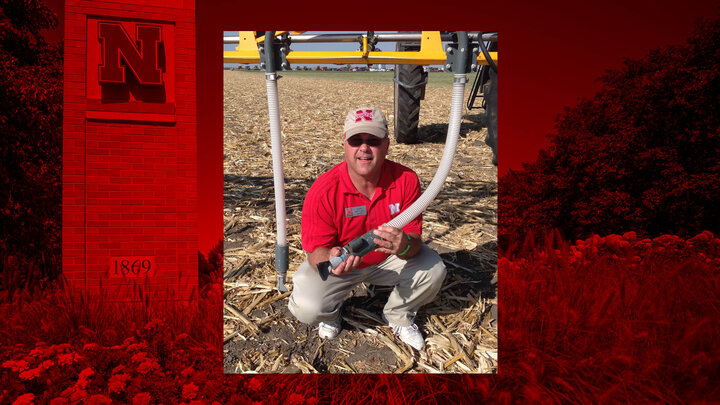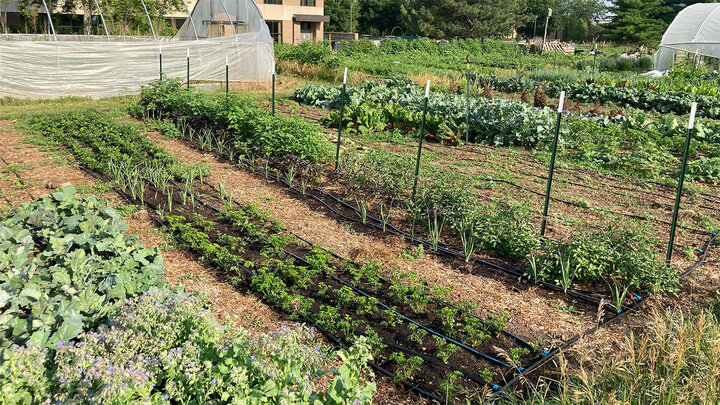Todd Whitney is an irrigation and cropping systems extension educator for the University of Nebraska-Lincoln housed at the West Central Research, Extension and Education Center in North Platte. He serves agricultural community members in Arthur, Grant, Hooker, Keith, Lincoln, Logan, McPherson and Thomas counties by helping them make informed irrigation decisions. Whitney says his job doesn’t feel like work because he loves serving others.
“Sometimes I enjoy working to the extent that I feel like I'm getting paid to come in and enjoy just doing what I'm doing,” Whitney said. “I don't really see it as work as much as a calling.”
Though he loves his job now, Whitney didn’t always know what career was right for him. As a young boy growing up on a farm in southeast Nebraska north of Humboldt, Whitney was familiar with Nebraska Extension from a programming standpoint as he participated in 4-H, watched Backyard Farmer with his mother and saw his father earn his certification in pesticide education. However, while he studied animal science, agronomy and agricultural education at the university, becoming an extension educator was not on his radar. He wanted to work in livestock because of an interest survey he did while in Future Farmers of America.
“I took every animal science course the university offered,” Whitney said.
But when Whitney arrived at Nebraska, he discovered there was a higher percentage of job opportunities in agronomy than livestock so he shifted his focus to expand his opportunities.
When he graduated with his bachelor’s in 1985, Whitney worked in feed sales and when he discovered he did not enjoy sales, became a high school teacher in Red Cloud. He enjoyed teaching but felt like he was not keeping up with the changes in the profession and began thinking about whether he could see himself as a teacher for the rest of his career or if his talents might be better applied elsewhere.
In 1990, Whitney found his calling as an extension educator when he went to work for extension at Kansas State University. He obtained his master’s degree in cropping systems and remained there for 23 years before joining Nebraska Extension in 2013.
“What I like about extension is it just fits my personality,” Whitney said. “I like to be of service to people, to be doing meaningful things.”
Every day is different as an extension educator, but Whitney’s main job is helping members of the agricultural community understand how to effectively use the soil and pivot sensors in their fields. These sensors monitor rainfall and evapotranspiration values to inform irrigation decisions, but the sensors are useless if the irrigator does not understand how to use them.
Whitney’s variable job allows him to speak with reporters about new crop knowledge and technology, answer irrigation and crop systems questions, help farmers conduct on-farm research, come up with topics for WCREEC educational webinars about research and industry changes and guide tours of the research happening at the center. His position also allows him to be a lifelong learner as he checks in with research teams often to stay current on agricultural technology and research, collaborates with people across Nebraska’s departments, including the Department of Agronomy and Horticulture and participates in the university’s Testing Ag Performance Solutions competition.
“I enjoy being challenged to try to keep up with what's new,” Whitney said. “And it's been very rewarding for me.”
Whitney said the job has changed a lot over the years, not only as his teams and assigned regions have changed, but as precision agriculture and drone technology have modernized agriculture. However, Whitney says the most challenging part of his job is helping people understand how extension can help them.
As a land-grant institution, Nebraska educates, conducts research and maintains a lesser-known extension arm. The goal of the nationwide Cooperative Extension System is to bring modern, applicable research and education directly from universities to agricultural producers, small businesses, consumers and young people to create positive change in rural and urban communities. Extension educators like Whitney serve communities through youth and family programming like the 4-H program, continuing education classes like food safety training and farm financial record keeping and by addressing public needs directly.
“I still think that there's a lot of people that don't really know what extension does,” Whitney said. “One of our biggest challenges has been making people aware of the resources we offer.”
Whitney is an Extension Educator Affiliate in the Department of Agronomy and Horticulture. This is a new program to strengthen connections between extension educators and department faculty in research, teaching and extension activities.




